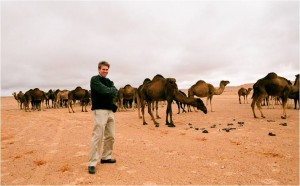It was 5:30 in the morning on Sept. 12, 2012. I had just fallen asleep, having been up all night talking with foreign service officers in the State Department, first with news that the Benghazi Mission had been attacked and that my brother was missing, then hours later that he had not survived the night. I called my brother and sister, our parents, and my brother’s girlfriend.
Dozing off in a daze, my phone rang. “The Secretary would like to speak with you,” said an unidentified voice. Secretary of State Hillary Clinton came on the line. She explained what happened, and I remember she said that justice would be done. This upset me. Chris was not focused on revenge. He wanted the Libyan people to have a free and democratic society. “I hope this will not prevent us from continuing to support the Libyan people, from moving ahead,” I said to her.
I had no idea at the time that I would help oversee one of those projects. But soon after that call, I learned that Chris had been working with Dr. Thomas Burke, an emergency physician at Massachusetts General Hospital. Thomas was in Benghazi the day that Chris and three other Americans were killed. His account of what happened was moving and informative, and I learned that Chris was working with him and leaders at Benghazi Medical Center to establish the country’s first modern emergency department and emergency care programs.
My brother hadn’t told me about this project, but the more I learned about it, the more sense it made. I knew that Chris saw what a fabulous country Libya could be, and he was trying to help make that happen by fostering and encouraging public-private collaborations. He could see history in the making from all sides of his work. And that’s why he was in Benghazi on that fateful day, instead of at his home base in much safer Tripoli.
My colleagues at Seattle Children’s said that they wanted to do something to honor Chris, and I brought them into the loop with my new friends at Mass General.
Helping Libya’s healthcare system
Benghazi has a modern medical center and plenty of doctors. But there are no ambulances, emergency medical technicians and no 911 system. There are no pediatric psychiatrists and no emergency medicine pediatricians. Benghazi has 25 fatal car crashes every day. Many of those accidents include children. Where do we start?
Thomas and his crew, including doctors from Libya, decided that for starters, we could bring doctors to the U.S. to provide training in poison control, and to train toxicologists. We could help establish a poison control call center, which could eventually provide a structure for a 911 system. There is currently no poison control center in all of the Middle East.
I return to Seattle today, having spent several days in Boston with Thomas, his colleague Dr. Stephen Bohan, and new friends from Libya, including Dr. Laila Bugaighis, assistant director general of Benghazi Medical Center. We have begun to discuss the ideas sketched out above, and we will now spend the next few days meeting with physicians and leaders at Seattle Children’s, Harborview and PATH.
It’s currently not safe for me to travel to Benghazi. But in the meantime, I look forward to establishing this partnership and project to honor Chris and to help advance some of the work he started.
I think about what happened to him a lot. I didn’t know how bold he was being at the time, with his travels to Benghazi, and I had no idea how dangerous it was for him. But I’m learning a lot. I’ve become, to my surprise, an unexpected diplomat. I think that he would like that.
Dr. Stevens studies auto-immune conditions including lupus, a condition in which the immune system mistakenly attacks healthy cells and tissues, damaging joints, skin, blood vessels and organs.
Remembering Chris Stevens
The Stevens family has established the J. Christopher Stevens Fund, with an aim to promote intercultural understanding between Americans and the people of the Middle East. The fund will support educational programs, including student exchanges, libraries and the Peace Corps.
They have also established a site to remember and honor Chris. Donations to the fund are accepted on this site.
“Libyan Women: War and Beyond” lecture
Dr. Bugaighis will speak at Health Frontlines: Insights from Benghazi on Friday, February 15, from 3:30 to 5 p.m. at the University of Washington, Health Sciences Building, Room T-625. She and leaders from Benghazi Medical Center will report from the field on their experiences during the Libyan Revolution. This talk is open to the public.
The lecture is sponsored by Seattle Children’s, Global WACh, Global Injury and Violence Prevention Initiative, Washington Global Health Alliance, UW Department of Global Health, The Henry M. Jackson School of International Studies at the UW and the UW Center for Global Studies.
For media:
Drs. Stevens, Bugaighis and Burke will be available for media interviews on Friday, Feb. 15, from 1 to 2 p.m. at Seattle Children’s Research Institute. If you’d like to attend, please contact us at (206) 987-4500 or at [email protected].


